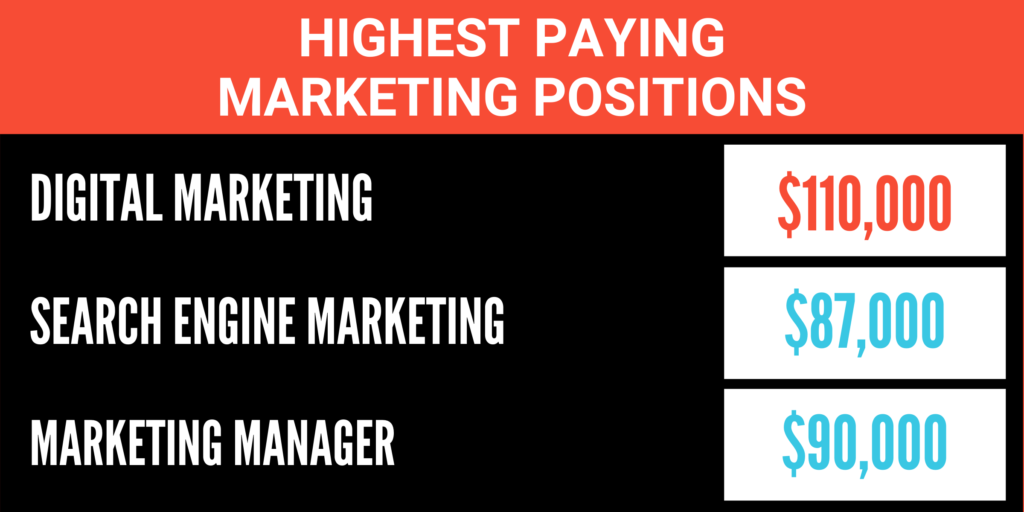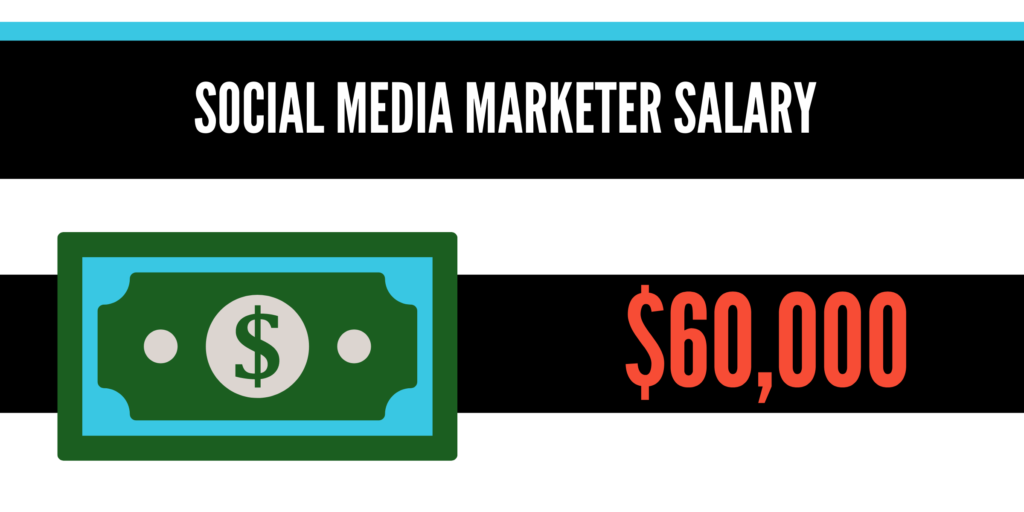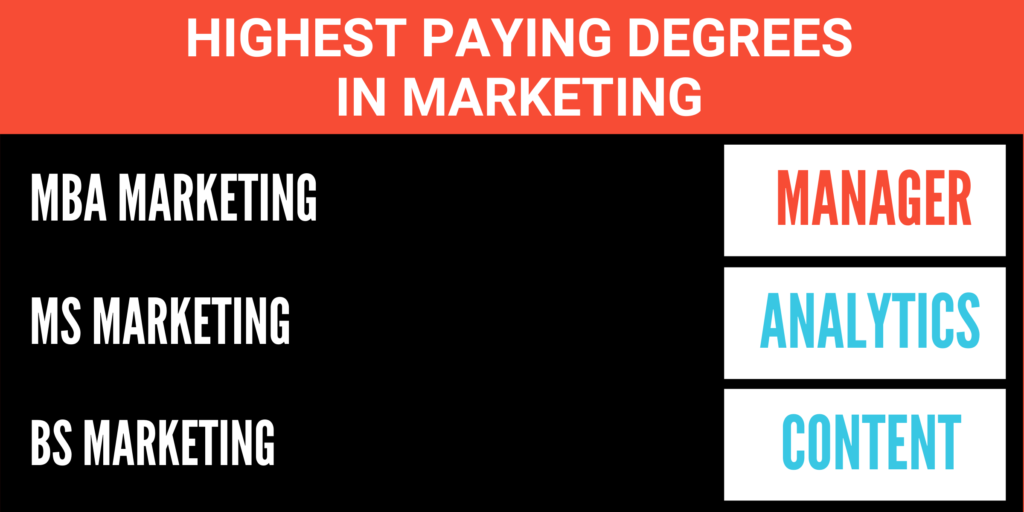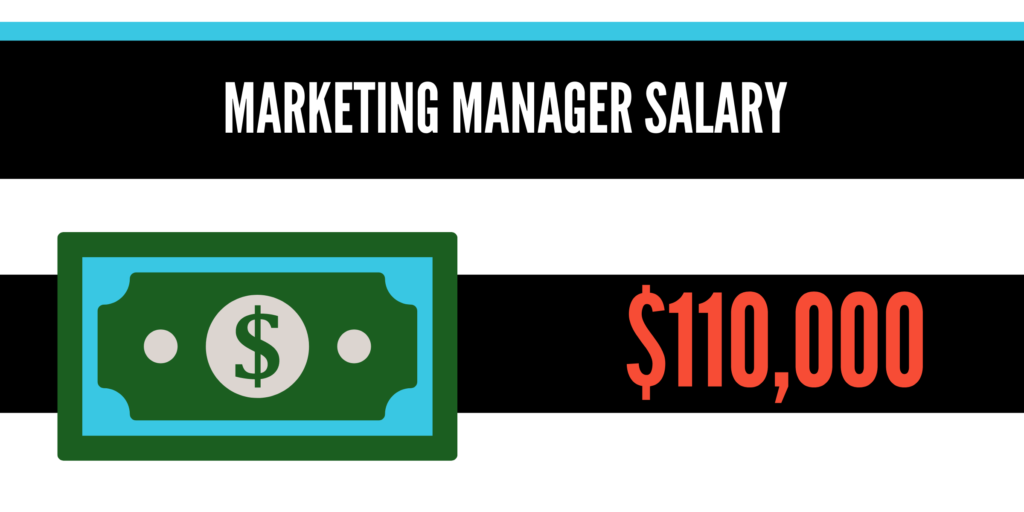A marketing degree can serve as a jumping off point in many different respectable and lucrative careers. The field of marketing as a whole constantly evolves as new technologies open the door to new marketing strategies and techniques. While many industries become increasingly outdated as new technology is developed, marketing becomes only more effective and efficient with technological developments.
This bears mentioning because marketing job markets continue to grow in the direction of technological integration with many of the most lucrative jobs being those that require technical specialization combined with marketing savvy. That is not to say however, that the traditional ‘ad men’ of old don’t still exist.

The Don Drapers of the world do still work with creative teams to come up with taglines, TV advertisements, and billboard designs. The difference is that these professionals are mostly required to also incorporate many different modern techniques in addition to their traditional approach as well. Modern techniques might be defined as those centered around online interactions, social media influence, and cultural brand impact.
Some marketing professionals might be able to find success by sticking exclusively to ‘the old ways,’ however there is no denying that the opportunities available to these professionals will be much less numerous, and likely less attractive in terms of compensation and upwards mobility. The simple fact is that the world of marketing is–at its core–a digitally-facing field. Prospects of the industry, who are interested in maximizing their earning potential and upward mobility, will want to tap into the currents that run toward technologization and digitalization.
Before we dive in to the highest paying degrees and career paths in marketing–consider these resources on the topic if you have more specific questions:
- DO ASSOCIATE DEGREE PROGRAMS IN MARKETING HAVE TIME TO SPECIALIZE IN CERTAIN AREAS OR ARE THEY FOCUSED ON OVERALL INFORMATION?
- DO MOST COMPANIES LOOK AT SOMEONE WITH AN ASSOCIATE’S DEGREE IN MARKETING AS BEING READY TO GET A FULL-TIME JOB IN THE FIELD?
- HOW TO LEARN MARKETING
- HOW MUCH STATISTICS KNOWLEDGE SHOULD I OBTAIN TO BE MORE SUCCESSFUL IN SALES AND MARKETING?
- WHEN IS THE BEST TIME FOR BACHELOR’S OF MARKETING STUDENTS TO BEGIN LOOKING FOR SUMMER INTERNSHIPS?
- WHAT WEBSITES SHOULD I KNOW HOW TO USE WHEN STARTING A MARKETING PROGRAM?
- WILL I LEARN ABOUT MARKETING IN GENERAL IN A BACHELOR’S DEGREE PROGRAM OR CAN I FOCUS ON PARTICULAR AREAS WITHIN MY DEGREE?
- THE 20 BEST ONLINE BACHELOR’S DEGREES IN MARKETING
- HOW MUCH CAN I MAKE WITH A DEGREE IN DIGITAL MARKETING?
- WHAT ARE THE HIGHEST-PAYING JOBS IN MARKETING?
- WHAT CAN I DO WITH A DEGREE IN MARKETING?
- WHAT DEGREE DO I NEED TO BECOME A DIGITAL MARKETING MANAGER?
- WHAT DEGREE DO MARKETING MANAGERS HAVE?
- WHAT IS THE DIFFERENCE BETWEEN A DEGREE IN MARKETING AND A DEGREE IN MARKET RESEARCH?
Making the Most of a Marketing Degree

There are a couple important factors to mention about a marketing education in the current climate of higher education. First of all, there has never been a better time to earn a marketing degree. Simply put there are more options available to prospective marketing students than ever before.
Marketing programs are typically among the most popular at larger universities, which has motivated such schools to develop online iterations of marketing degree programs. This means that many of the country’s best marketing degrees can now be earned entirely through online work. Why is this important?
Well, most notably it is important because the field of marketing is one that rewards seniority, experience, and specialization. Degrees and professional credentials are important but are valued in-tandem with experience. Online education empowers students to progress through a marketing degree program while holding down a part-time or even full-time job. This allows students to benefit from the best of both worlds–simultaneously advancing one’s academic pedigree while building real world job experience.
Of course to maximize the value of this opportunity, working students will want to ensure that their job is building experience in the area. Otherwise it might be more time-effective to invest one’s time in a full time degree program.
Marketing Degree Specializations

Marketing careers reward expertise, experience, and professional specialization. Thankfully, students can begin establishing a specialization in a marketing degree program. Many programs offer a catalogue of specialization options, and even those that do not offer official degree specialization tracks will typically offer enough electives and flexibility in studies for students to begin carving out one or multiple concentrations.
In the case of a program lacking specialization tracks, students can work toward expertise by pursuing specialized research projects or by pursuing internships in a key area of the market. But ideally, students will be able to find a degree program that is designed specifically to confer their desired specialization.
Before we dive into which specializations and career tracks are most lucrative, let’s break down the degree specializations that are available and what each entails. Here are 16 of the most common marketing degree specializations (note that salaries are largely dependent on level of education, experience, and geographic location so the listed ranges are based on middle-of-the-road estimates from Payscale and Salary.com):
- Digital Marketing
Digital marketing is one of the most explosive sectors of the marketing industry, and in reality most marketing professions will at least dabble in digital marketing. Digital marketing refers to the field of activities that occur in the digital space–encapsulation online marketing, social media strategies, e-commerce, web design, and search engine optimization. Most marketing degree programs will have curriculums that touch on these subjects.
Degrees available: Associate’s, Bachelor’s, Master’s, and Doctorates
Formats: On-campus, online, hybrid, and graduate certificates
Average Salary Range: $70,000 to $130,000
- Market Research
Market research is all about collecting intel for a key objective or inquiry. Professionals who specialize in market research will be masters of collecting and grooming key market data. The methods they use will depend on the scope and context of their position–ranging from master-level computer science to beginner level google research.
Most marketing degree programs will delve into this subject, however students will want to pursue a specialized degree program in this area if they wish to pursue it professionally.
Degrees available: Associate’s, Bachelor’s, Master’s, and Doctorates
Formats: On-campus, online, hybrid, and graduate certificates
Average Salary Range: $35,000 to $85,000
- Business Analytics
Business analytics is a specialization that is most typically associated with business degree programs, but it is becoming an increasingly integral part of the marketing profession. Business analytics slightly differs from market research, in that business analytics delves more deeply into the business side of a given operation–fiscal strategy, profit-loss analytics, and general business model positioning.
Marketing degree programs may or may not cover topics in this context. Students may need to enroll in a business degree program that offers a marketing degree specialization.
Degrees available: Associate’s, Bachelor’s, Master’s, and Doctorates
Formats: On-campus, online, hybrid, and graduate certificates
Average Salary Range: $56,000 to $85,000
- Content Marketing
Content marketing is the area of the industry wherein professionals employ various types of content to fulfill certain marketing-oriented objectives. Content marketers usually specialize in one medium or another–video content, blog articles, or social media posts.
This subject will at least be partially covered in marketing degree programs curriculums, but students who are professionally interested will want to pursue a degree specialization in the subject.
Degrees available: Associate’s, Bachelor’s, Master’s, and Doctorates
Formats: On-campus, online, hybrid, and graduate certificates
Average Salary Range: $42,000 to $83,000
- Search Engine Marketing (SEM)
Search engine marketing or SEM is the field wherein professionals master all things related to search engines in the context of facilitating brand visibility and bolstering google’s respect of a brand’s web presence. Tasks within this field incorporate elements of content marketing, web design, and search engine optimization.
This is a specialized subject, and marketing degree programs may or may not devote much of the curriculum to it, however there are specialized programs designed specifically to build this specialization.
Degrees available: Bachelor’s, Master’s, and Doctorates
Formats: On-campus, online, hybrid, and graduate certificates
Average Salary Range: $57,000 to $97,000
- Video Marketing
Video marketers work at the intersection of graphic design, videography, and marketing. Picture a Venn Diagram where these three subjects overlap and you’ll have an idea of the subject matter of video marketing. Particular professionals will pursue work that may skew more in one direction or another, but the fundamentals are the same–video marketers use video content to pursue promotional objectives.
Degrees available: Bachelor’s, Master’s, and Doctorates
Formats: On-campus, online, hybrid, and graduate certificates
Average Salary Range: $32,000 to $95,000
- Direct Marketing
When you go to a store or shop online with a website like Amazon, you are essentially utilizing a middle-man, someone who facilitates the sale of products to customers. Direct marketers however, specialize in the sale of products directly from the manufacturer to the customer without the use of a retailer, typically organized in a ready-made offer or package like those you might see in mail order catalogues or TV promotion.
This is a specialized route of study, and will require a specialized program or graduate certificate.
Degrees available: Bachelor’s, Master’s, and Doctorates
Formats: On-campus, online, hybrid, and graduate certificates
Average Salary Range: $93,000 to $110,000
- Database Marketing
Database marketing is the modern iteration of direct marketing wherein professionals utilize a database of customer information to deliver promotions, prompts, or other content directly to consumers. Oftentimes this outreach is customized based on the demographic information of each customer in the database, and as such database marketing is one that benefits immensely from technological advances in these areas.
This is a specialized route of study, and will require a specialized program or graduate certificate.
Degrees available: Bachelor’s, Master’s, and Doctorates
Formats: On-campus, online, hybrid, and graduate certificates
Average Salary Range: $85,000 to $96,000
- Social Media Marketing
Social media marketers are at the forefront of brand development, promotion, and paid advertisement on social media platforms. This is one of the most explosive areas of the marketing industry, and has expanded with career opportunities at both the entry level and the high end–meaning it provides excellent opportunities for students to pursue upward mobility throughout their careers, even while just starting out.
Most marketing degree programs will touch on this subject, however digital marketing programs will be more likely to cover the matter in-depth. Also, programs designed entirely around the social media specialization are becoming increasingly prolific.
Degrees available: Associate’s, Bachelor’s, Master’s, and Doctorates
Formats: On-campus, online, hybrid, and graduate certificates
Average Salary Range: $53,000 to $86,000
- Influencer Marketing
Influencer marketing is a burgeoning field within the marketing space wherein professionals look to maximize marketing efforts relating to influencer-promotions and brand relations. Social media influencers are public figures within a niche community–from a few thousand followers to tens of millions, as such there is an influencer for every budget. Influence marketers either participate as influencers themselves, or look to maximize the effectiveness of influencers they hire.
This is a specialty-area and only the most modern marketing curriculums will sufficiently cover this topic. Those professionally interested will need to pursue a relevant degree concentration, or tailor their own through related studies and projects.
Degrees available: Bachelor’s, Master’s
Formats: On-campus, online, hybrid, and graduate certificates
Average Salary Range: $65,000 to $104,000
- Guerilla Marketing
Guerilla marketing is an innovative new permutation of the marketing profession wherein strategies are focused on ‘causing a splash’ and inciting uproarious attention. Guerilla marketers might stage a stunt in a public area or use atypical methods like graffiti advertisements. Basically, guerilla marketers use atypical and creative methods to inspire consumer involvement.
Because this is such an atypical field and is based on unpredictable methods, marketing degree programs are unlikely to cover this subject with much comprehensivity. Prospects of this field will want to pursue internships, research projects, or volunteer to participate in guerilla campaigns.
Graduate certificates available
Average Salary Range: $42,000 to $65,000
- Event Marketing
Event marketers work in a field closely related to guerilla marketing, but work more within the bounds of what is considered standard marketing practices. Event marketers develop events to engage communities, build brand awareness, and prompt consumer interest. In an age of digital marketing and online obsessions, many consumers appreciate the human element of old-school event-style interactions.
This is a niche area of the marketing field, and as such marketing degree programs may or may not offer coursework and concentrations in this area.
Graduate certificates available
Average Salary Range: $58,000 to $72,000
- Marketing Management
Marketing is big business, and thousands of agencies specialize in offering marketing services around the world. These agencies range from small, local operations to large international conglomerates employing tens of thousands of employees. And whether it be a marketing team made up of a few marketers or dozens of them, there is a need for a specialized manager to oversee them. These professionals combine a mastery of marketing fundamentals with the business-knowhow associated with business management.
Marketing management is a common focus in traditional marketing degree programs, particularly those at the undergraduate and graduate level. Those who are set on pursuing work as a marketing manager will want to look into degree programs designed specifically for enabling this pursuit.
Degrees available: Associate’s, Bachelor’s, Master’s, and Doctorates
Formats: On-campus, online, hybrid, and graduate certificates
Average Salary Range: $81,000 to $140,000
- Product Marketing
Product marketing is the field associated with a specialization in presenting, promoting, and eventually selling specific products. Unlike general marketers, product marketers focus their efforts on a single product in a company’s catalogue. As such they may work closely with the manufacturer and company executives to ensure that a product is designed from the ground up to meet both micro and macro business-marketing objectives.
Product marketing is a fundamental aspect of the career, but marketing degree programs will be more or less likely to devote the curriculum to it depending on the scope and mission of the program.
Degrees available: Associate’s, Bachelor’s, Master’s, and Doctorates
Formats: On-campus, online, hybrid, and graduate certificates
Average Salary Range: $77,000 to $124,000
- Public Relations
Public relations may not first come to mind when thinking of traditional marketing roles, but it embodies the fundamentals of marketing in many ways. Public relations is the field where professionals work to ensure an organization’s good standing with the public. These professionals work in all the same capacities of a marketer, however they view their organization’s reputation as their product and the public as the consumer. Note: public relations managers make roughly double the salary range listed below.
Marketing degree programs may or may not devote much of the curriculum to public relations, so it will likely be necessary for those interested in this work to pursue a specialized program.
Degrees available: Associate’s, Bachelor’s, Master’s, and Doctorates
Formats: On-campus, online, hybrid, and graduate certificates
Average Salary Range: $40,000 to $80,000
- Marketing Technology
This area is less a specialization, and is more of a theme. As marketing technology becomes more technical, it is becoming increasingly common for high end marketing professionals to pursue study in computer science, information technology, or software development. So with this in mind, marketing professionals may want to put effort into learning and mastering high-end, technical marketing technology. Exactly how to go about this will depend entirely on the particular types of technology one is interested in–such as database development, software engineering, or web development.
Those interested in this area will want to consider an IT degree program with a marketing specialization, or perhaps a double major that allows simultaneous study in both areas.
Fastest Growing Industries for Marketing Managers
Because the marketing industry is filled with such diverse roles and career paths, it can be difficult to judge the pulse of various industries. But given that the job market for marketing managers is representative of overall opportunity in the industry, we will further explore the promising industries and growth in specific industries for marketing managers. Let’s dive in:
There were 314,900 marketing managers in 2019 and the job market is growing at a rate of 6% that is projected to carry through from 2019 to 2029. This is significantly better growth than the overall national average of job growth which sits at 4%. The median pay for marketing managers in 2019 was $135,900.
Learn more about how much you can make with a degree in digital marketing.

Earning potential by common-industry for marketing managers breaks down as follows:
- Finance and insurance $145,720
- Management of companies and enterprises $145,510
- Professional, scientific, and technical services $145,300
- Manufacturing $138,950
- Wholesale trade $128,680
Earning potential by common-industry for advertising and promotions managers breaks down as follows:
- Advertising, public relations, and related services $147,100
- Management of companies and enterprises $119,250
- Information $106,270
- Wholesale trade $86,700
The top paying industries for marketing managers, however are as follows:

- Cable and Other Subscription Programming $190,730
- Oil and Gas Extraction $190,070
- Scientific Research and Development Services $188,320
- Motion Picture and Video Industries $179,910
- Aerospace Product and Parts Manufacturing $177,530
The industries with the largest number of job opportunities are as follows:
- Management of Companies and Enterprises – 40,300 jobs- $157,750
- Computer Systems Design and Related Services – 18,830 jobs – $162,810
- Management, Scientific, and Technical Consulting Services – 17,880 jobs – $147,000
- Advertising, Public Relations, and Related Services – 9,140 jobs – $153,910
- Credit Intermediation and Related Activities – 8,480 – $150,160
The industries with the highest concentration of opportunities are as follows (marketing managers in relation to other jobs):
- Lessors of Nonfinancial Intangible Assets – 640 jobs – $149,960
- Advertising, Public Relations, and Related Services – 9,140 jobs – $153,910
- Other Information Services – 5,960 jobs – $175,330
- Management of Companies and Enterprises – 40,300 jobs – $157,750
- Software Publishers – 6,070 jobs – $162,240
Most Promising Areas for Marketing Managers

While choosing a promising industry is certainly important, it can be as important or even more important to pursue a job in a certain area of the country. An important note here is that some of the most seductive salaries on paper might be countered by the extremely high cost of living in the area.
Here are the states with the highest number of marketing manager positions:
- California
- 40,900 jobs
- $169,200
- Illinois
- 21,980 jobs
- $133,280
- New York
- 21,550 jobs
- $186,350
- Massachusetts
- 16,720 jobs
- $144,000
- Texas
- 16,290 jobs
- $149,420
Here are the states with the most lucrative marketing manager positions:
- New York
- 21,550 jobs
- $186,350
- New Jersey
- 11,220 jobs
- $178,300
- Virginia
- 5,150 jobs
- $175,970
- Colorado
- 3,800 jobs
- $171,970
- California
- 40,900 jobs
- $169,200
New York seems to offer one of the highest numbers of marketing manager opportunities combined with the highest salary averages. And given the capabilities for remote work in this field, professionals may want to look closely at opportunities in New York even if they have no interest in relocating.

